|
|
| |
|
|
|
| The
Story of Joe and Tony Ierullo: “Helping People Make a Connection” |
| By
Oliviana Mingarelli |
| The
Ierullo family is one of Preston Street’s oldest and most loved
families. |
|
Joe Ierullo was the first member of his family to immigrate
to Canada from Vallalonga, Calabria in 1928. Upon arriving in Canada,
Joe was sent to work in the mines in Timmins, Ontario. However, he soon
found himself joining a crew of workers to help build Canada’s
railroad. When he arrived in Ottawa with his crew, Joe came to an important
decision: he would quit the railroad and stay here. Though he remained
in construction for some more time, his decision allowed him to meet
his future wife Vittoria Maviglia.
“The
story of Joe and Vittoria was a wonderful love affair,” says
his sister-in-law Marie.
Joe
did not wish to spend his life within construction. So, with the help
of some good friends, he mastered the art of barbering. In 1936 he
bought a house on Preston Street and converted the front into a barbershop
and the back into a home for his quickly growing family. His first
and only son, Tony, was born in 1934, followed by three sisters (Theresa,
Rosa and Silvia) all only one year apart.
|
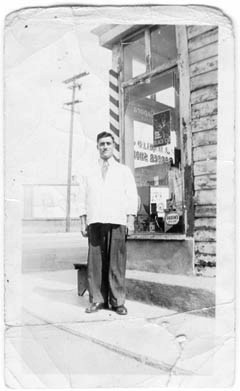 |
| Joe,
proud owner and founder of Joe Ierullo’s Barbershop. |
|
| Little
did Joe know what an impact his barbershop would have on the Italian
community. The barbershop, which remains one of Ottawa’s oldest
businesses, became (and still is) a hub for gathering and interesting
conversation. |
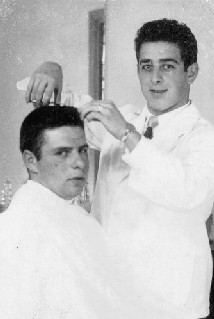 |
| Tony
began helping his father at a
young age. |
|
“We
could always see people coming and going” says his eldest daughter
Theresa. “I remember as a child when sitting around the supper
table my father would recount many stories dealing with health, politics,
history or whatever else he felt was good for us to know. It made
me feel proud to see how knowledgeable he was.”
Silvia,
the youngest of the family, recalls busy Saturdays and how her mother
used to make zambaglion with cognac and how she, having the least
amount of housework, would stay behind the shop door holding the food
until her father had a minute to gulp it down.
The existence
of a place like the barbershop was very important to the community. |
| “It
was a form of communication,” explains Theresa. “This
took the form of Il Postino, The Ottawa Cititzen
or CJOH for an earlier time. In the winter people would come by simply
to talk, nothing else.”
However,
even though business was an important part of his life, Joe never
worked on Sundays and would often bring his family to Constance Bay
where they would enjoy an afternoon of fishing and swimming. The Ierullo
house acted on Sundays much as the barbershop did during the week.
|
| “Sunday
was a day to receive friends and family” says Theresa. “My
dad always had to have his music so after our family lunch people
would drop by throughout the day. My dad loved to dance.”
Being
a very proud and family centered man, Joe wanted his son Tony to follow
in his footsteps and work at the barbershop, with the intention of
eventually leaving Tony the business. Though Tony struggled with this
for a few years (preferring to go into construction or following his
leather-working hobby), he did eventually agree to pursue the barbering
trade.
“Legacy
is very important to Italian families,” says Silvia. Tony following
in his father’s footsteps meant the world to Joe. Joe and Tony
became a true father and son team, both bringing unique qualities
to their trade. Tony grew to love his trade as much or perhaps more
than his father. |
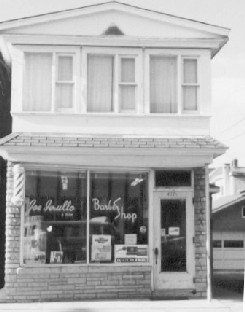 |
| The
original barbershop on Preston Street, still operating after almost
a century. |
|
His
wife Gail explains: “people would come in to talk about anything,
sports, children etc. At 5:30 one of his friends used to come in after
work, get his haircut and sit there and chat and chat with Tony. I would
have to go to the door and knock to say ‘dinner’s on the
table dear,’ but he still wouldn’t leave. He would say ‘just
a minute, just a minute.’ He couldn’t turn anyone away.”
Tony really loved not only his job, but the people as well. He took
pride in his work and believed that as an entrepreneur he also had a
responsibility to the community. Therefore, like his father before him,
he attempted to give to the community as much as it had given him. Joe
wanted other people to be able to come to Canada, establish themselves
and then send for their families (much as he had). Joe and Vittoria
helped many people find jobs, houses, whatever they needed. This tradition
was passed on to their son Tony. Tony’s daughter Gina remembers
that he would sometimes pull out money, without any expectation of ever
seeing it again, and give it to a friend or person in need. He knew
how hard life could be and was thankful to have been able to do so well
for himself. |
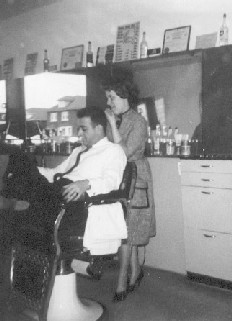 |
|
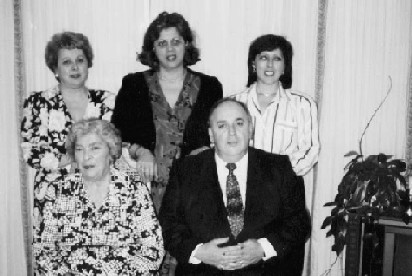 |
| Tony
and his wife Gail. |
|
Back:
Daughters Theresa, Rosa and Silvia; Front: Vittoria and son Tony. |
|
| “Joe
and Tony helped people make a connection,” says Joe’s
sister-in-law Marie.
The barbershop
on Preston Street was a place where everyone knew your name. People
felt like family and this created a bond that is stronger than any
brick and will therefore exist forever. Gail says that the family
has no intention of selling the business any time soon. For now, due
to Tony’s declining health, his children are looking after the
business. However, even if one day they do sell the barbershop, the
connections they made in the community within those walls will never
fade. The respect this family has earned for their prominent role
within the Italian community will live on from one generation to the
next. |
|
| back
to the top |
|





